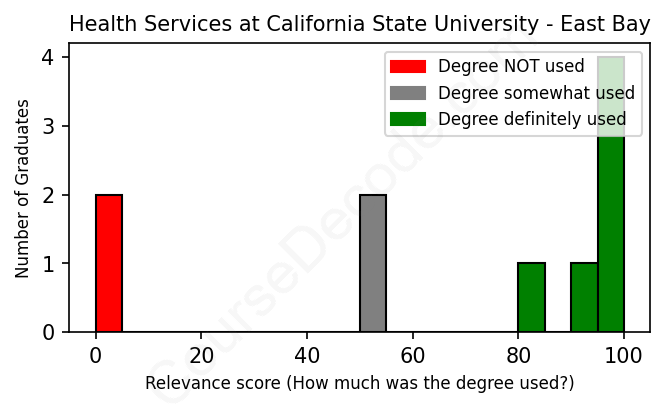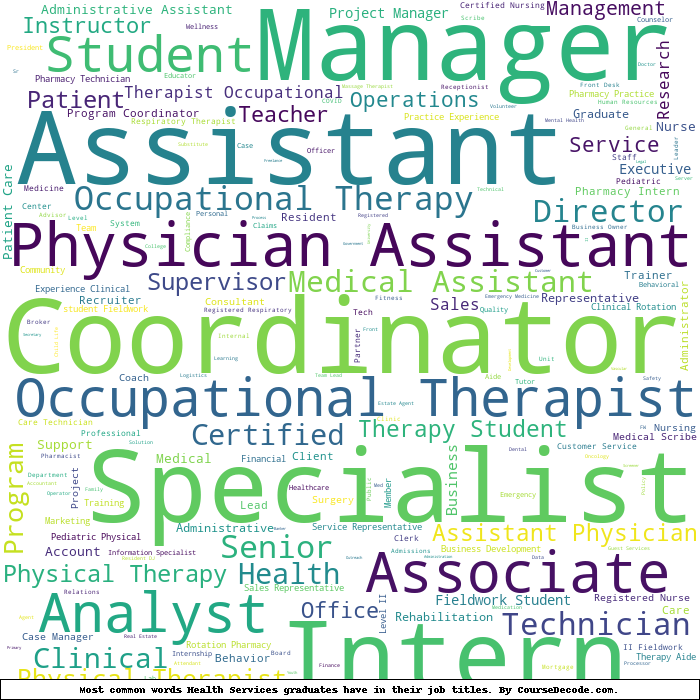
First, some facts. Of the Health Services graduates from California State University - East Bay we've analyzed , here's how many have used (or NOT used) their degree in their career:

These are estimates based on AI analysis of 10 LinkedIn profiles (see below).
The verdict? Slightly below average. Overall, with an average relevance score of 66%, Health Services graduates from California State University - East Bay have a slightly lower likelihood (-1%) of finding work in this field compared to the average graduate across all fields:
And for comparison, here's the chart for all profiles we've looked at across all degrees.
Also, after graduating, only 20% of these graduates have pursued further education other than another Bachelor's degree (such as a Masters degree or other), compared to the average across all profiles of 35%. This suggests a Bachelors degree is enough for most Health Services graduates, and it's normal to look for work straight after graduation.
See the details:
|
Relevance score: 0% We think this person has NOT gone into a career related to their degree. We think this person has NOT gone into a career related to their degree.
DEGREE INFOGraduated in 2022 from California State University - East Bay with a Bachelor of Science - BS in Health Services. No other secondary education since. JOB HISTORY SINCE GRADUATIONAssistant Manager Crumbl Cookies Jan 2023 - Apr 2023 General Manager  Crumbl Cookies Apr 2023 - Present ABOUTNo information provided. |
The top 10 most common jobs done by the graduates we've analyzed (ranked most common to least) are:
After analyzing the job profiles of graduates from California State University - East Bay who have degrees in Health Services, it’s pretty clear that there are a mix of relevant and unrelated roles. A significant trend among these folks is the prevalence of positions like Occupational Therapists, Medical Assistants, and positions in healthcare administration, which directly utilize the skills and knowledge they gained during their studies. These jobs connect strongly to the core principles of health services, focusing on patient care, rehabilitation, and managing healthcare processes.
However, not all roles these graduates have taken up are related to health services. Positions such as actors, receptionists in non-medical settings, and managers in food service have little to do with their degree. This suggests that while many graduates find paths that directly apply their education, others venture into fields that don’t leverage their health services training, perhaps driven by personal interests or job market opportunities. Overall, the relevance of their jobs varies widely, with a noticeable group successfully entering the healthcare field, while others seem to pursue completely different career paths.
Here is a visual representation of the most common words in job titles for Health Services graduates (this is across all Health Services graduates we've analyzed, not just those who went to California State University - East Bay):

Graduates from California State University - East Bay who studied Health Services seem to have carved out a pretty diverse set of career paths after finishing their degree. For many, their first job tends to be somewhat aligned with the health field, bringing them into roles like internships or entry-level positions in healthcare settings. For example, you'll find some starting as medical assistants, coordinators, or even subbing in educational roles that relate closely to health services. It's a solid start that connects them to the industry, and those initial roles often lead to more specific positions, especially for those who continually seek additional training or responsibilities within healthcare, like occupational therapy or nursing. However, there are also graduates who ventured into more unexpected areas like acting or managerial roles outside the healthcare field, suggesting that the degree allows for some flexibility in career choices.
Fast forward five to ten years, and the picture becomes more varied. A chunk of graduates can be found in reputable healthcare positions, such as occupational therapists, clinical specialists, or nursing roles, which reflects a steady growth into responsibilities that make a direct impact on patient care. Others drift towards administrative and management positions, indicating that some have steered more into the back-end processes of healthcare organizations. Still, there are those who seem to have taken a different route altogether, working in non-healthcare jobs like managing a bakery chain or other unrelated fields. While many have successfully transitioned into roles that leverage their health services education, it's clear that some have diverged from that path entirely, highlighting the diverse experiences and choices available to these graduates.
Honestly, a Bachelor’s degree in Health Services at California State University - East Bay can be a bit of a mixed bag. It’s not the easiest degree out there, but it’s also not the hardest; you’ll find that it has a good balance of coursework that’s interesting and relevant but can also challenge you, especially if you’re not super into sciences or research. You’ll cover topics like healthcare systems, policy, and community health, which can be really engaging, but you might also encounter some rigorous classes that require solid critical thinking skills. Overall, if you stay organized and on top of your studies, it's totally manageable! Just be prepared to put in the effort.
Most commonly, in the LinkedIn profiles we've looked at, it takes people 4 years to finish a Bachelor degree in Health Services.
Alright, so looking at these Health Services grads from Cal State East Bay, it seems like they’ve landed some pretty decent jobs overall. The Occupational Therapist track is particularly promising, with roles in various healthcare settings that usually pay well, especially as they gain experience. The person working as a Controlling Manager also seems to be in a solid position since management roles typically come with better pay. On the flip side, some folks, like the Actor or those in more entry-level roles, might not be pulling in as much cash, especially if they’re in gig work or part-time positions. But overall, many in this list appear to be on a good path toward decent earnings in healthcare and management fields.
Here is a visual representation of the most common words seen in the "about" section of LinkedIn profiles who have a Bachelor degree in Health Services (this is across all Health Services graduates we've analyzed, not just those who went to California State University - East Bay). This may or may not be useful:

Here are all colleges offering a Bachelor degree in Health Services (ordered by the average relevance score of their Health Services graduates, best to worst) where we have analyzed at least 10 of their graduates:
| College | Score | Count |
|---|---|---|
 The Ohio State University The Ohio State University
|
88 | 14 |
 Quinnipiac University Quinnipiac University
|
88 | 10 |
 Grand Valley State University Grand Valley State University
|
87 | 16 |
 University of Tampa University of Tampa
|
87 | 10 |
 Stony Brook University Stony Brook University
|
80 | 15 |
 Boston University Boston University
|
79 | 12 |
 University of Connecticut University of Connecticut
|
78 | 26 |
 Florida Agricultural and Mechanical University Florida Agricultural and Mechanical University
|
76 | 12 |
 Texas A&M University Texas A&M University
|
72 | 16 |
 University of South Florida University of South Florida
|
72 | 26 |
 Boise State University Boise State University
|
71 | 11 |
 University of Central Florida University of Central Florida
|
68 | 47 |
 Florida Gulf Coast University Florida Gulf Coast University
|
68 | 10 |
 James Madison University James Madison University
|
66 | 26 |
 University of Missouri-Columbia University of Missouri-Columbia
|
66 | 17 |
 California State University, Fullerton California State University, Fullerton
|
66 | 13 |
 California State University - East Bay California State University - East Bay
|
66 | 10 |
 Arizona State University Arizona State University
|
62 | 10 |
 Cleveland State University Cleveland State University
|
60 | 10 |
 Stockton University Stockton University
|
58 | 12 |